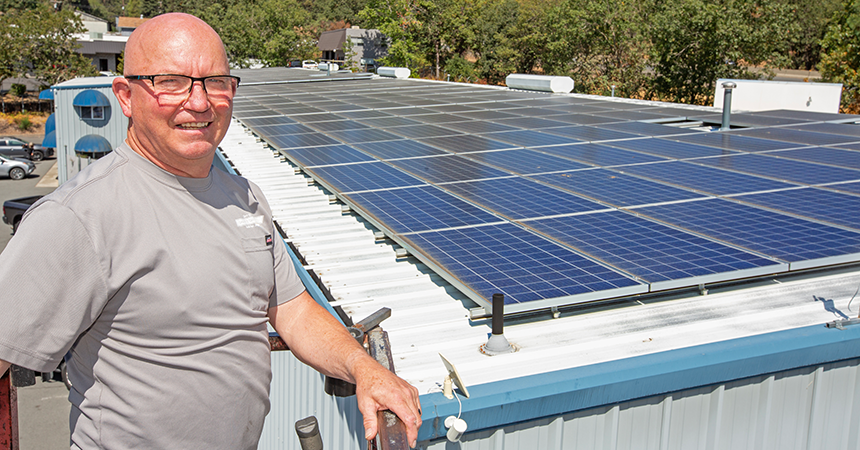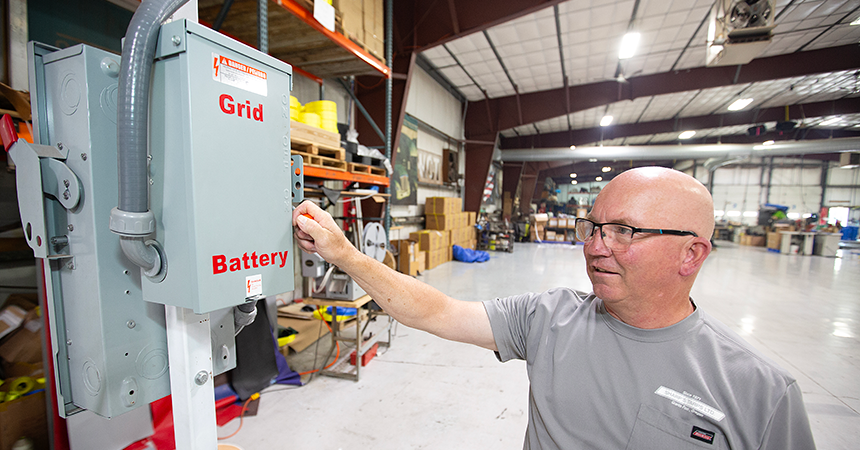
Solar power paired with battery storage is giving Sharp’s Tarps Ltd., a truck tarp manufacturer headquartered in Grants Pass, an extra edge in controlling energy costs—even as their electrical load increased. Energy Trust cash incentives helped the project pencil out.
“We wanted to decrease our electric bill. That was the big motivator,” said Mont Sharp, president of the family business that his father founded more than 50 years ago.
The company manufactures, repairs and delivers heavy duty tarps that cover the sides of semi-trailer trucks.
Sharp’s Tarps manufacturing floor is busy with employees welding panels, sewing and attaching grommets to tarps. But as summer temperatures trend upward, the space could be hot and “miserable,” so Sharp added a new HVAC system to provide air conditioning. The cooling meant higher energy use.
To offset this increase in energy consumption and manage demand charges on their bill, Sharp connected with Solar Man Company LLC, an Energy Trust solar trade ally contractor, to add solar panels and a robust battery storage array. These new additions supplement an existing solar system. As a Pacific Power customer, Sharp’s Tarps qualified for Energy Trust cash incentives totaling $16,422, which covered nearly 25% of the project total. A federal tax credit further reduced costs and shortened the payback period.
Sharp became a fan of solar more than a decade ago after installing a system on his house that produced enough renewable energy to cover all of his energy usage. “I figured if it worked so well at home and incentives were still available, I wanted to take a look at it for the business.”
Sharp’s Tarps first installed solar at their Grants Pass manufacturing facility in 2015. Energy Trust cash incentives and a federal tax credit reduced those project costs, too. The system generates roughly 87,000 kilowatt-hours of clean energy annually, saving over $6,900 every year on energy bills. (They also installed solar at a second location in Vancouver, Washington.)
The new solar addition, completed in the fall of 2024, added another 13,000 kWh of annual solar generation. That was enough power to cover the increase in energy usage from cooling and a new piece of manufacturing equipment. And while many businesses and homeowners add battery storage for essential backup power, resiliency was not Sharp’s goal with the new solar + storage installation. Instead, he wanted to use battery storage to avoid higher demand charges on the company’s utility bill.
“At times during the day when we ran equipment with the highest energy use, it increased the threshold and would push us into a higher billing rate. Now, instead, we run off the battery during the day to reduce the amp draw at peak times. At night, we recharge the battery with energy from the grid. We generate enough solar power that it all balances out and keeps our costs low,” said Sharp.
The balancing out is thanks to net metering. A bidirectional meter keeps track of both how much solar power Sharp’s Tarps is sending to the utility grid and how much energy it draws from the grid. When they generate more energy than they use, the surplus energy generates kilowatt-hour credits that are applied to future electric bills.
The company’s recent solar upgrade is estimated to save an additional $1,000 annually through power generation alone. By avoiding higher demand charges, they are saving even more.
Sharp says he feels good knowing that the company is generating its own solar energy and managing costs with the battery backup. “I have peace of mind knowing that I have control over our energy expenses.”
Curious about solar + storage for your business? Get a free, no-obligation analysis and bid from an Energy Trust solar trade ally contractor.

